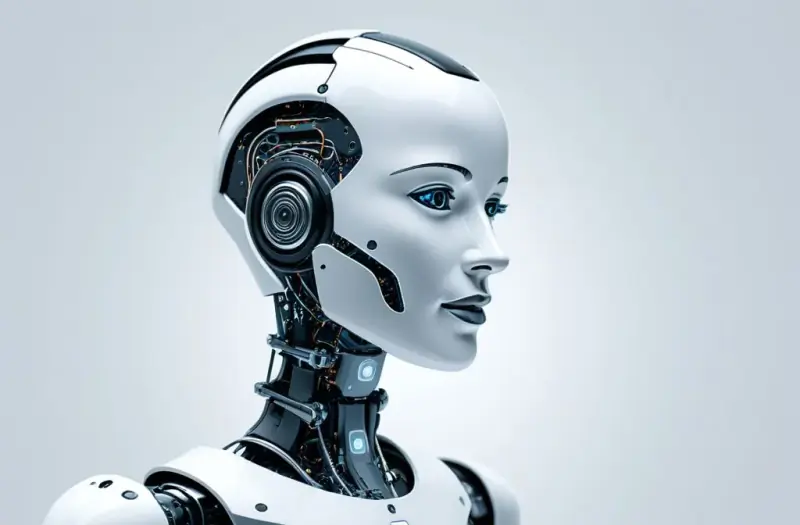AI Ethics: Principles, Challenges, and Solutions

Table of Contents
Introduction
As artificial intelligence (AI) continues to evolve and integrate into nearly every facet of modern life, the ethical considerations surrounding its development and deployment have become increasingly critical. We find ourselves at the crossroads of innovation and morality, where the decisions we make today about AI ethics will shape the future for generations to come. This conversation is not just for technologists and policymakers; it is a dialogue that includes all of us because the impact of AI ethics touches every aspect of society.
In this article, we will explore the key concepts and challenges of AI ethics. We aim to shed light on the moral implications of AI, examine the principles that should guide responsible AI development, and address the ethical dilemmas that arise from the rapid advancement of this powerful technology.
What Is AI Ethics?

Understanding the Basics
At its core, AI ethics refers to the system of moral principles that govern the development and use of artificial intelligence. Just as human ethics guide our actions and decisions, AI ethics aim to ensure that AI systems behave in ways that are fair, transparent, and accountable. The field of AI ethics is broad, covering issues from AI fairness to AI accountability, and it requires the input of various disciplines, including philosophy, computer science, and law.
The Importance of Ethical AI
Why is ethical AI so important? The answer lies in the potential consequences of AI gone wrong. AI systems can have a profound impact on society, from influencing decisions in criminal justice to determining access to healthcare. If not designed with ethical considerations in mind, these systems could perpetuate biases, violate privacy, or even cause harm. Ethical AI is about ensuring that these technologies are developed in a way that respects human rights and promotes social good.
The Challenges of AI Morality
Navigating AI morality is no simple task. AI systems are often designed to optimize specific outcomes, but what happens when those outcomes conflict with ethical considerations? For example, an AI designed to maximize profits might do so at the expense of fair labor practices. The challenge is to create AI systems that can balance competing values and make decisions that align with ethical principles.
The Ethical Implications of AI in Decision-Making
AI Bias and Fairness
One of the most pressing concerns in AI ethics is the issue of AI bias. AI systems learn from data, and if that data contains biases, the AI is likely to replicate and even amplify those biases. This can lead to unfair outcomes, particularly in areas like hiring, lending, and law enforcement. Ensuring AI fairness requires careful attention to the data used to train AI systems and the algorithms that process that data.
- AI fairness is not just a technical issue; it’s a moral imperative.
- Addressing AI bias involves both identifying biases in existing data and creating mechanisms to mitigate those biases.
- Transparency and accountability in AI systems are key to fostering trust and ensuring that AI is used ethically.
AI Accountability and Transparency
AI accountability refers to the responsibility of developers, organizations, and governments to ensure that AI systems are used in ways that are ethical and just. This includes being transparent about how AI systems make decisions and providing mechanisms for redress when things go wrong.
- AI transparency is critical to building trust in AI systems.
- Accountability mechanisms should be in place to address errors and biases in AI decision-making.
- Clear guidelines and standards are necessary to govern the ethical use of AI across different sectors.
Responsible AI Governance
The governance of AI is another crucial aspect of AI ethics. As AI becomes more pervasive, there is a growing need for frameworks that ensure responsible AI development and use. This involves creating policies that promote ethical AI practices and prevent misuse.
- AI governance should involve a wide range of stakeholders, including governments, industry leaders, and civil society.
- Ethical principles should guide AI governance, with an emphasis on human rights, fairness, and accountability.
- Global cooperation is essential to address the cross-border nature of AI technologies.
AI in Healthcare: Ethical Considerations

Privacy and Data Security
In healthcare, AI has the potential to revolutionize patient care, but it also raises significant ethical concerns, particularly around privacy and data security. AI systems often require access to vast amounts of personal health data to function effectively. Protecting this data is crucial to maintaining patient trust and ensuring that AI is used responsibly.
- Data security measures must be robust to prevent unauthorized access to sensitive information.
- Informed consent is necessary when using AI to analyze patient data.
- Transparency about how AI systems use and protect data is essential to maintaining ethical standards in healthcare.
The Impact on Healthcare Equity
AI has the potential to improve healthcare outcomes, but it also risks exacerbating existing inequalities. For example, AI systems that are trained on data from predominantly white populations may not perform as well for people of color, leading to disparities in care. Ensuring that AI is used equitably in healthcare requires addressing these biases and ensuring that AI systems are designed to serve diverse populations.
- Equitable AI in healthcare is about providing fair and just care for all patients.
- Addressing biases in AI healthcare systems is crucial to promoting healthcare equity.
- Inclusive data and diverse perspectives are key to creating ethical AI in healthcare.
The Future of AI Ethics
Ethical AI Principles
As we look to the future, the development of ethical AI principles will be essential to guiding the responsible use of AI. These principles should be grounded in human rights, fairness, and accountability, and they should be flexible enough to adapt to new challenges as AI technology evolves.
- Human-centered design should be at the core of AI ethics.
- Collaboration between technologists, ethicists, and policymakers is essential to developing ethical AI principles.
- Ongoing dialogue is necessary to address the evolving ethical challenges posed by AI.
The Role of International Cooperation
Given the global nature of AI technology, international cooperation will be critical to ensuring that AI is developed and used ethically. This includes creating global standards for AI governance and promoting the sharing of best practices across borders.
- Global standards for AI ethics can help ensure consistent ethical practices.
- International collaboration can facilitate the sharing of knowledge and resources.
- Ethical AI requires a global effort to address the complex challenges it presents.
FAQs
What is AI ethics?
AI ethics refers to the system of moral principles that govern the development and use of artificial intelligence. It aims to ensure that AI systems are fair, transparent, and accountable.
Why is AI fairness important?
AI fairness is crucial because biased AI systems can lead to unfair outcomes, particularly in areas like hiring, lending, and law enforcement. Ensuring AI fairness is a moral imperative that requires attention to data and algorithmic transparency.
How can we ensure AI accountability?
AI accountability can be ensured by establishing clear guidelines and standards, promoting transparency in AI decision-making, and creating mechanisms for redress when errors occur.
What are the ethical implications of AI in healthcare?
The ethical implications of AI in healthcare include concerns around privacy and data security, as well as the potential for AI to exacerbate existing healthcare inequalities. Addressing these issues is essential to promoting ethical AI in healthcare.
What role does international cooperation play in AI ethics?
International cooperation is crucial to developing global standards for AI governance and ensuring that AI is used ethically across borders. This collaboration can help address the complex challenges posed by AI technology.
Conclusion
In conclusion, navigating the moral implications of artificial intelligence is a complex and ongoing challenge. AI ethics is not just about preventing harm; it’s about ensuring that AI is used to promote social good and respect human rights. As we continue to develop and deploy AI systems, we must remain vigilant in our commitment to ethical principles, accountability, and transparency. The future of AI holds immense potential, but it is up to all of us to ensure that this potential is realized in ways that are just and fair.
Key Takeaways
- AI ethics is essential to ensuring that AI systems are fair, transparent, and accountable.
- AI bias and fairness are critical issues that require careful attention to data and algorithms.
- Accountability and transparency are key to building trust in AI systems.
- Responsible AI governance involves creating policies that promote ethical AI practices and prevent misuse.
- Ethical AI principles should guide the development and use of AI, with a focus on human rights, fairness, and accountability.
- International cooperation is necessary to address the global nature of AI and promote ethical practices across borders.
By keeping these key takeaways in mind, we can work together to build a future where artificial intelligence is a force for good, promoting fairness, justice, and respect for all.
Popular Tags
ADS SPACE HERE


